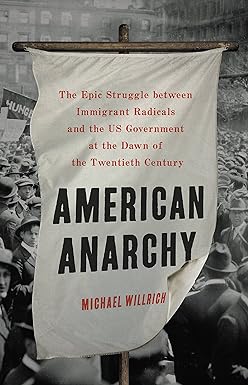
An impulse grab off the "New Nonfiction" table of the Portsmouth Public Library. Hey, I'm an American! And (some days) I am (kind of) an anarchist! When I read about Biden, Trump, various Congressional clowns, … could anarchy possibly be worse? Then I read about Haiti, Somalia, … yeah, I think probably it could.
The author, Michael Willrich, is a history prof at Brandeis.
Coincidentally, I'm also reading The Individualists by Matt Zwolinski and John Tomasi, an intellectual history of libertarianism, which includes the anarchist flavor of libertarianism. So far, there's not a lot of overlap! Willrich mentions (briefly) Henry George and Benjamin Tucker, that's about it. If you want to read about Lysander Spooner or Albert Jay Nock, you'll have to go elsewhere. (Like The Individualists; it's really very good.)
Willrich concentrates on Emma Goldman and her ideological soulmates, mostly immigrants, many of them Jewish exiles from Tsarist Russia. To the extent they had a coherent philosophy, it was in the mode of Pierre-Joseph "Property is Theft" Proudhon and Peter Kropotkin.
Goldman and her ideological cohort were bitter foes of capitalism; one of Emma's early efforts at "activism" was in plotting the murder of Carnegie Steel's VP, Henry Clay Frick. Her boyfriend, Alexander Berkman, made the attempt, but Frick survived. He went to jail, she didn't. At least not for that.
At the time, US authorities were quite concerned with the possibility of labor unrest mixed with the communistic philosophies of the anarchists giving rise to violent revolution, like in Russia. That fear was not totally unfounded. Fun fact: Wikipedia has a "category" page devoted to anarchist assassins. Thirty-five of them, including (of course) Leon Czolgosz, who did in President McKinley. Czolgosz claimed to have been "set on fire" by a speech he attended, given by, yup, Emma Goldman.
(Willrich barely mentions anarchists Sacco and Vanzetti, convicted and excecuted in proceedings largely considered unfair. He doesn't go into whether they were actually guilty. They probably were.)
That fear of anarchist activity quickly turned into the authorities trampling on all kinds of civil liberties, paired with law enforcement's proclivity to thuggish tactics. And that combined with America's entry into World War I; anarchists quickly painted this as a war designed by capitalist plutocrats to defend their ill-gotten privileges. Legislation was passed to (essentially) outlaw dissent, and the anarchists were judged to have run afoul of it. The net was cast wide; to get in legal trouble, you just had to have (at some point) joined an organization whose leadership arguably held (at some point) unacceptable beliefs. You didn't actually need to have expressed those beliefs yourself.
Some non-anarchists were aghast. Others not. After a massive raid carried out by Woodrow Wilson's Department of Justice, the Washington Post regretted the legal hoops law enforcement had to jump through to get these pesky anarchists, and opined "A firing squad would be much more effective and impressive."
Bottom line: many of those anarchists, including Goldman, were eventually deported off to the fledgeling Soviet Union. Not that the USSR was any more congenial to their beliefs. Goldman was surprised and disappointed by Lenin's totalitarianism; he was even more intolerant of anarchist dissent than the American authorities. (I know, quelle surprise, right? I live in the future too.) She wound up bounced out of Russia, living her remaining life in more capitalist countries.
New Hampshire's own Elizabeth Gurley Flynn is a relatively minor character in the book. Willrich doesn't mention her intellectual odyssey, which went from Goldman-style labor activism to full-fledged Communist and Stalinist fangirl.
Margaret Sanger also appears, as cooperating with Goldman in efforts to inform the public about the details of birth control, another sore spot with the authorities. Willrich doesn't go into their embrace of eugenics, something even Planned Parenthood acknowledges these days. (You'd think that would be something a Brandeis prof might find worth mentioning in these days of wokeness, but no.)
In other spots, Willrich wanders into TMI-land. On page 172, we're informed that a primary lawyer for the anarchists, Harry Weinberger, was appointed to be commisioner of deeds by alderman Frank J. Dotzler, who (in turn) "won the Tammany Hall steak-eating contest in 1910 by putting away eleven and a quarter pounds of meat." As near as I can tell, Dotzler does not figure elsewhere in the Willrich's narrative, but if I had been writing the book, I'd have added this 1920 news story: 340 lb Santa Stuck in Chimney. Yep, that was Frank.
Willrich does however, to his credit, reflect on the "great irony" of Goldman's legal struggles with American authorities relying so much on the legal framework of the Constitution. Which her ideology claimed was a sham, designed to protect the oligarchy. Ironic, sure, but how opportunistic and cynical was that strategy? I don't think Willrich goes into that.
![[The Blogger and His Dog]](/ps/images/me_with_barney.jpg)



